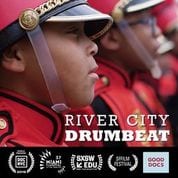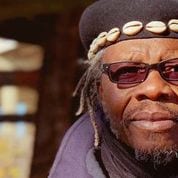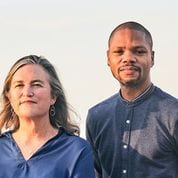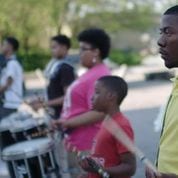
Here in Glen Park, artists and creative types of all kinds have found welcoming arms and an environment that nurtures their spirit.
One of them is Anne Flatté, 51, a documentary filmmaker and, for the past fifteen years, a resident of Chenery Street with her husband and two sons. Describing herself as “not really a city girl,” she was raised in Santa Cruz. To her, the most important thing about the neighborhood is Glen Canyon Park. “The only way I could stay in the city was to be near the canyon and walk there every day once or twice to get connected with nature. She always took Rocky, her rescue dog, there until, at fifteen, he went into retirement. “I walk everywhere, I don’t have to get in the car. And the small community of businesses makes it feel really close.”
Flatté’s latest feature is River City Drumbeat, which she co-directed with Marlon Johnson. It’s having its virtual debut August 7, and will finish its run on August 21, at the Roxie Virtual Cinema. (The brick and mortar theater is in the Mission.)
It will also be shown virtually by independent theaters in New York, Louisville and other cities across the country.
The film tells the story of the River City Drum Corps in Louisville, Kentucky, and its founder, Edward “Nardie” White—Mr. White to everyone– who’s devoted his life to leading, teaching and mentoring the youth of his city through music, from kindergarten through high school. With his wife, Zambia Nkrumah, Mr. White spent three decades inspiring the youth of their West Louisville neighborhood to thrive, by connecting them with the art and cultural traditions of their African ancestors. Their connections with each other live on as alumni. Their motto is “River City Drum Corps for life.”

As Mr. White prepares to retire with the future of the drum corps uncertain, a former student, Albert Shumake, steps forward to take the baton. Shumake is now a father of a young daughter, and still works as a DJ (known as DJ Always). He must learn the complexities and logistics of running the organization and filling Mr. White’s very large shoes.
In the film, we get to know many of the students and see them navigate the obstacles and hardships of their lives, and achieve their triumphs through grit, determination, and the love and support of the adults around them. We see the student drummers perform, the group becoming one, together in music and joy. This is not just an extracurricular activity. It’s an experience that connects them with their African roots and will help carry them through the rest of their lives.
(For more information and to view the trailer, go to: https://www.roxie.com/river-city-drumbeat/)
It’s a long way from Glen Park to West Louisville. Flatté took a very indirect route, as is the case with many artists. She moved to San Francisco in the early nineties, and graduated from UC Berkeley with a degree in Middle Eastern studies. She was interested in the conflict that was raging in that part of the world and the first Gulf War put her on the path to study it. She also harbored a love of film but, growing up, it seemed like a fantasy career and she didn’t know anyone who actually made films. Her plans to go to Egypt and Syria to study were scuttled by the war, so after graduation she worked for a magazine and became its art director.
In time, Flatté came to the decision that she wanted to make films. “I realized how powerful films are in terms of shaping the way we think about ourselves and the world. I’m very interested in how people really change, learn, and how they feel like they know someone. If you can’t get to know someone in person, the next best thing is either in a book or a film. Film spoke to me as a visual person. Later, working with music and film together, it just really made my heart sing. I found what I wanted to do.”
Flatté’s love of filmmaking comes, in part, through the collaborative experience. “In the process of making a film, you’re with a team and I enjoyed that a lot.”
With film school being very expensive, Flatté started taking affordable classes at SF State Extended Education, the Bay Area Video Coalition, and all of the places in the Bay Area that support people who want to explore film. From there she got her Master’s degree in Documentary Film and Video from Stanford.
At first, she made short films and relied on the encouragement of her teachers; she learned by watching films and observing the techniques of filmmaking. “The key is to just start.” Then she needed work. One of her early films was a personal one about her parents’ complicated marriage. Making a film involving her own life helped her to understand what she was asking other people to do when she asked them to be in a documentary film.
She made her opportunities by beginning at the bottom and building a network–by word of mouth, recommendations, and joining organizations for women in film and the Stanford Alumni.
“And a lot of years of working, just working on something.”
She wanted to do independent films and took editing jobs on others’ projects. She also produced, directed and edited educational and non-profit videos. “Independent films are very independent! A lot of people have other jobs to make it work.” Later she worked on a web series of shorts and got into directing feature films. Ultimately, she got to be one of the directors of River City Drumbeat, her feature film directing debut.
She was drawn to make films about artists and musicians because they’re trying to get to the truth of what’s going on in the human condition in multifaceted ways.
“Artists are truth tellers.” There’s a lot of joy in art and music and Flatté likes to explore joyous topics as well as serious ones. Flatté says that the power of film is to move people into a nonverbal feeling of emotions which are very important to understanding the human condition. “People are not logical, in my opinion.”
One of the elements that drew Flatté to the story of the River City Drum Corps was the great value placed on mentoring youth, which connected with her own experience as a human being and as a parent. “I thought back to all the caring adults who had taken so much time to teach and help me on my path, beginning with my parents who valued music and art and learning…In every school I attended, there were individual teachers who took the time to care about me, my mind and my path. ”
To learn more about the River City Drum Corps: https://rivercitydrumcorpky.org

Her directing partner is Marlon Johnson, whom she got to know when she was filming segments about the New World Symphony in Miami. They were both working on projects produced by Owsley Brown, owner of a San Francisco film production company, Owsley Brown Presents, and a native of Louisville.
Johnson grew up in Miami, in a similar situation to the students in Louisville, and had experienced the saving grace of the arts in his own story to become a successful filmmaker. His life experience resonated very deeply with the drum corps, and had a profound impact on the film.
Flatté and Johnson shared a mutual passion for music documentary; both had worked in Louisville; and Owsley Brown had had a vision of doing the drum corps movie for years. The pieces were beginning to fall into place.
Flatté and Johnson met Mr. White in Louisville with hopes that he’d approve their collaboration on the film. Flatté recalls, “Mr. White said, ‘Hurry up because I’m leaving next year!’”
Owsley Brown Presents secured financing for the film. Through the SF Film Society, which puts on the San Francisco International Film Festival each year, Flatté and Johnson got a residency, which provided mentorship and a community of thirty other filmmakers in the program.
Filming took eighteen months, during which time they traveled to Louisville every six weeks for several days. Flatté says of the process: “It takes a long time to do. You don’t know what the story is that will actually emerge. It was a creative collaboration among White, Shumake, the drum corps and us. They are artists too and it was incredibly important to do right by them.”
The film was edited in San Francisco and completed with the work of many talented local artists.
River City Drumbeat had its world premiere at the DOC NYC film festival in 2019. It’s been getting out to the rest of the world through festivals, community screenings, virtual releases, and virtual events. Eventually it might get onto one of the streaming platforms.
The pandemic and the Black Lives Matter movement have caused “an incredible shift in our thinking and our lives,” says Flatté. Plans for a traditional release path had to be scrapped. Flatté has decided to embrace the virtual world.
For the rest of this year, Flatté will be working to get independent distribution of the film. After taking three to four years on that project, she’ll be developing new ones, within the context of Covid safety. Then there’s fiction, scriptwriting, something Covid-related, and developing her overall artistic process.
Her belief in the power of film is strong:
“I have met people along the way who have shared their stories with me, and I understood how these stories connected people with each other. This is the theme of what I think is important—we all are connected and are trying to open doors for people to get to know other people. When you do that you realize that we all want very similar things. I was interested in conflict before and then I moved toward: How can we move away from conflict and towards a better world? And I felt that it was through connecting with people. And that led me to film, and it also helped me. It just spoke to my heart.”
